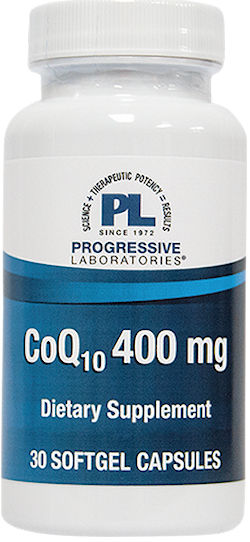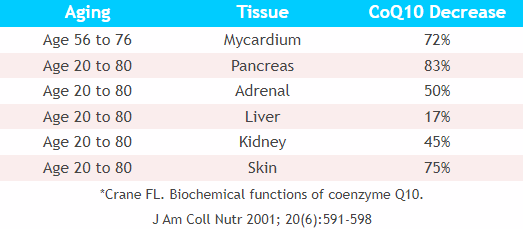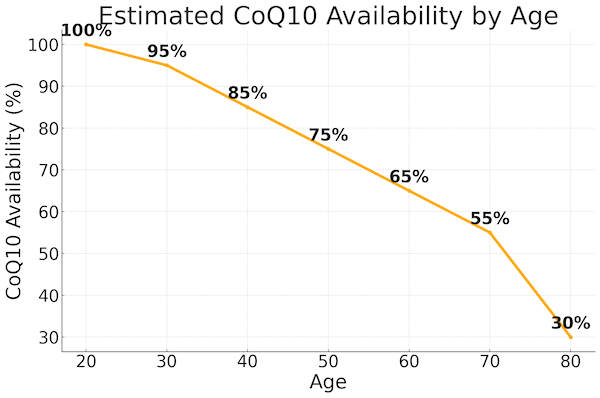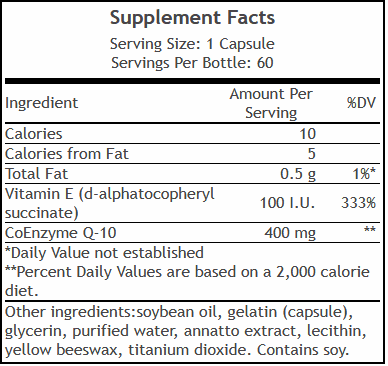
CoQ10: The Spark That Turns Fuel Into Energy
What Makes Our CoQ10 - 400mg Supplement Stand Out?
Imagine every cell in your body running on a microscopic engine. CoQ10 is the spark plug—the key molecule that helps convert fats and sugars into pure energy inside your mitochondria. Without it, your engine sputters.
We offer two potencies, our standard CoQ10 - 100 mg per capsule and this robut formulation 400 mg of CoQ10 per capsule — the highest potency we offer — crafted not for those who simply want to check a box or say they “take everything,” but for those who actually want to feel a difference. This advanced oil-based formulation supports smoother digestion and greater bioavailability, helping your body absorb more, use more, and experience the full potential of CoQ10.*
Why Consider Supplementing with CoQ10 - 400mg?
Because energy supports everything. This nutrient plays a central role in mitochondrial energy output, which many people associate with vitality, drive, and resilience.*
Energy isn’t just nice to have—it’s what lets you live, create, move, and thrive. CoQ10 supports the cellular spark behind it all, so you can keep showing up at your best—day after day, year after year.*
When CoQ10 runs low, so does your energy—it really is that simple*
Our mitochondria generate energy by processing fuel in the presence of oxygen—and CoQ10 supports this cellular process.*
If we compared our cellular mitochondria to an engine, CoQ10 would be like the fuel injector—a component that helps regulate and optimize the fuel conversion process.
Since energy production is foundational to cellular health, it’s no surprise that CoQ10 levels and overall energy capacity often trend together. As CoQ10 diminishes with age, it may become more difficult for cells to maintain peak metabolic performance.*
Research indicates that by age 80, up to 80% of cellular CoQ10 levels present at age 25 may be depleted. In particular, tissues like the pancreas—important for digestive enzyme output—appear to show a significant reduction. It’s understandable why digestion may feel less efficient over time. Many find that CoQ10 supplementation offers meaningful support in these areas.*
If you're over the age of 30, maintaining healthy CoQ10 levels may be one of the most overlooked steps toward supporting daily energy, long-term wellness, and future vitality.*
*These statements have not been evaluated by the Food and Drug Administration. This product is not intended to diagnose, treat, cure, or prevent any disease.
CoQ10 Decreases in Human Tissues as We Age


Looking at the above charts/graphs... No wonder we notice a difference in how we feel as we age.
- No wonder CoQ10 has drawn interest from supplement formulators around the globe—cellular energy production isn’t exactly what it used to be.
- No wonder so many people notice changes in how their body performs when they support their mitochondria.*
- No wonder skin, of all things, has a way of showing us how time affects inner biology.*
- No wonder the pancreas—an unsung hero—seems to quietly demand more attention over time.*
- No wonder those pivotal years between 56 and 76 often tell a tale about what we’ve supported… and what we haven’t.*
*These observations are not intended to diagnose, treat, cure, or prevent any disease. They are simply patterns worth paying attention to.
Does It Matter Which Kind of CoQ10 We Take?
Some manufacturers promote the idea that reduced CoQ10 (ubiquinol) is significantly better than the standard oxidized form (ubiquinone). This claim appears more tied to marketing trends than to clear, consistent science. In practice, both forms are absorbed and utilized by the body, and conversion between them occurs naturally depending on cellular needs. What seems to matter more is **how** CoQ10 is taken—**with healthy fats and absorption-enhancing compounds** like Bioperine (black pepper extract), bioavailability may improve significantly.
However, What CoQ10 Is Taken With Does Matter
The absorption of CoQ10 may be influenced by what it’s consumed with. Nutrients such as **vitamin E**, **Bioperine® (black pepper extract)**, and **healthy dietary fats** have been shown to help enhance its uptake. Having one or more of these companions present in the stomach at the same time may support better delivery of CoQ10 into the bloodstream and ultimately into the cells. That’s one reason CoQ10 400 mg includes oil in its formulation — because that oil ensures it digests very well.
Summary of CoQ10 Benefits:
- Helps reduce mitochondrial damage and enhances energy output, which is why CoQ10 supplementation is well known to support cardiovascular function.
- Scientists are now discovering that CoQ10 contributes to a longer life, the result of the supplement's augmentation of mitochondrial function in brain structure and function, lung defense mechanisms, and disorders related to poor glycemic control and the metabolic syndrome.
- Total body health depends heavily on maintaining mitochondrial integrity.
- CoQ10 represents an efficient way to optimize mitochondrial output by maintaining co-enzyme Q10 blood levels in youthful ranges.
What is an Optimal Daily Amount of CoQ10 400 mg to Take — By Age:
- 30s: 100 mg — 1 capsule CoQ10 -100 mg AM
- 40s: 200 mg — 1 capsule CoQ10 -100 mg AM and 1 capsule CoQ10 -100 mg at noon
- 50s: 300 mg — 1 capsule CoQ10 -100 mg AM, 1 capsule CoQ10 -100 mg at noon, and 1 capsule CoQ10 -100 mg in PM
- 60s: 400 mg — 1 CoQ10 400 softgel AM
- 70s: 500 mg — 1 CoQ10 400 softgel AM and 1 CoQ10 -100 mg capsule in PM
- 80s: 600 mg — 1 CoQ10 400 softgel AM, 1 CoQ10 -100 mg capsule at noon, and 1 CoQ10 -100 mg capsule in PM
- 90s: 800 mg — 1 CoQ10 400 softgel AM, and 2 CoQ10 -100 mg capsules at noon, and 1 CoQ10 -100 mg capsule in PM
CoQ10 400 mg Ordering Form
Comparative Retail Price: $69.95 per bottle.
Our Price: $64.25 per 30 softgel count bottle
CoQ10 400 mg


How to Use
Take one to two capsules daily, depending on age, quality of health and tolerance, and always take with food (to improve absorption).
Videos about CoQ10
We disclaim any claims (if there are any) made in these videos. They are for information, education, enlightenment and entertainment only.


